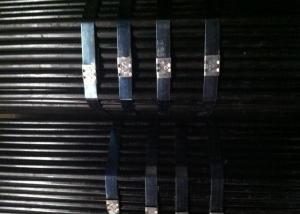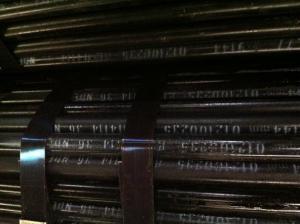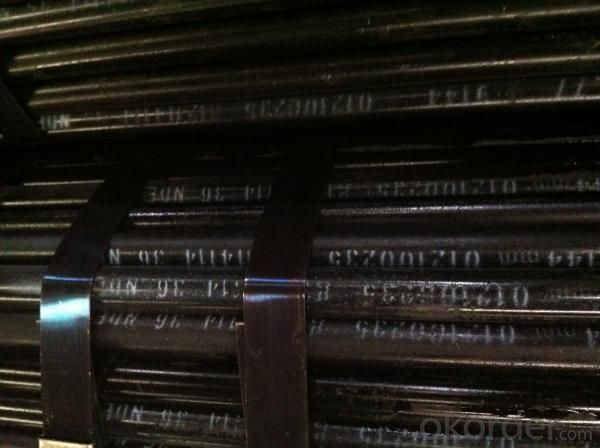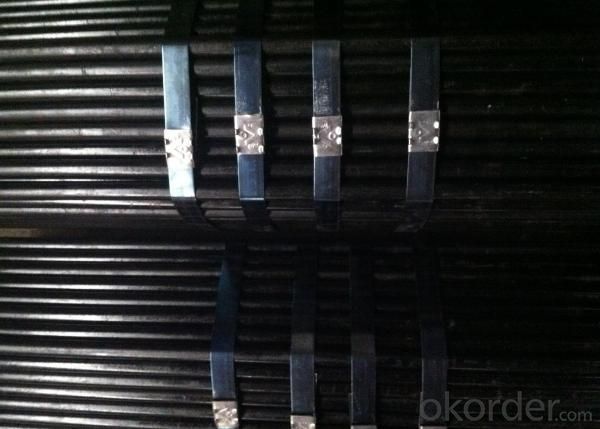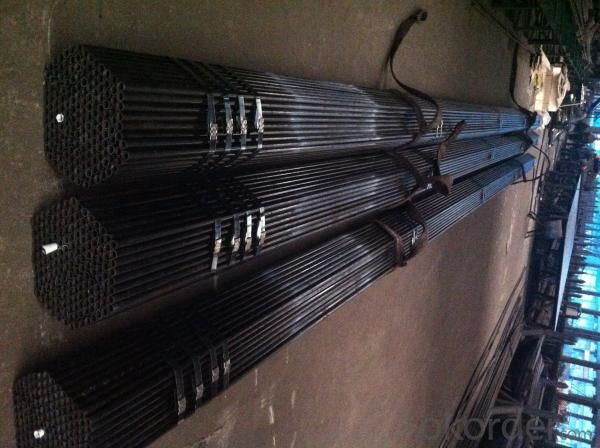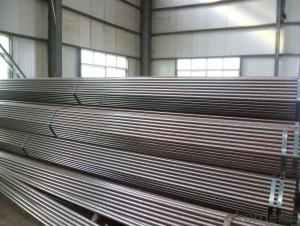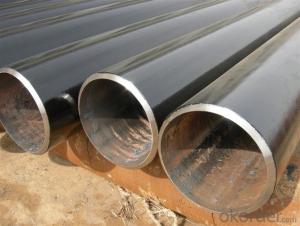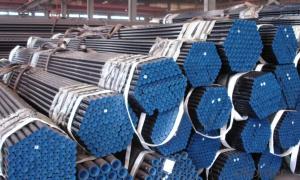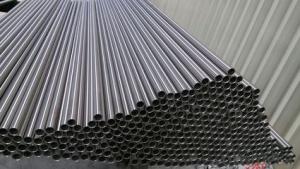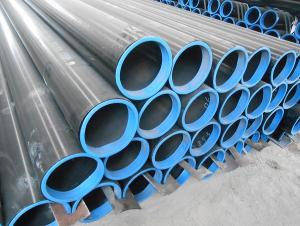High Temperature Seamless Carbon Steel Pipe
- Loading Port:
- China Main Port
- Payment Terms:
- TT or LC
- Min Order Qty:
- 20MT m.t.
- Supply Capability:
- 5000 Tons Per Month m.t./month
OKorder Service Pledge
OKorder Financial Service
You Might Also Like
Specifications of High Temperature Seamless Carbon Steel Pipe:
Standard : ASTM A106/ASME SA106
Main steel pipe grade : A106A 、 A106B 、 A 106C etc. (Other grade is also negotiable.)
Chemical Composition(%)&Mechanical Propertise :
Standard
Grade
Chemical Composition(%)
C Mn Si Cu Ni Cr Mo V P S
ASTMA106/ ASMESA106
Mechanical Propertise
Tensile Strength(Mpa)
Yield Strength(Mpa)
A
≥ 330
≥ 205
B
≥ 415
≥ 240
C
≥ 485
≥ 275
Usage/Applications:It is used for conveying water,petroleum,gas and other common fluids.
Packaging & Delivery:
Each bundles pipes will be bundled with 6-8 pcs steel strips and with shipping marks and 2 nylon strips
40-50 days delivery on china port upon receiving orinigal LC or prepayment.
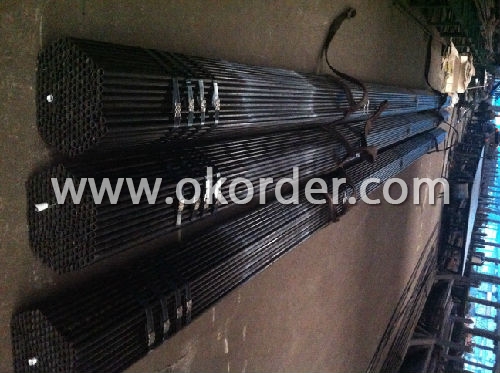
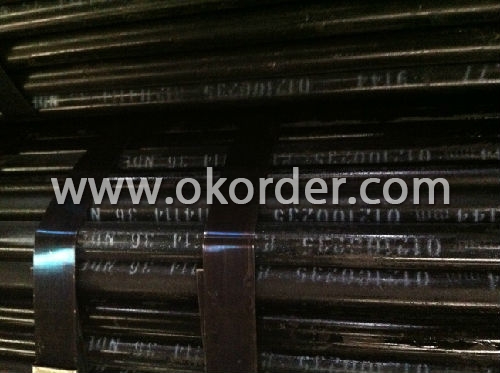
- Q: What is the difference between steel pipes and PPR pipes?
- Steel pipes and PPR (Polypropylene Random Copolymer) pipes are two different types of pipes commonly used in various industries and applications. The main difference lies in their material composition and properties. Steel pipes are made from steel, a strong and durable metal. They are known for their high tensile strength, resistance to extreme temperatures, and ability to withstand high pressure. Steel pipes are commonly used for transporting fluids and gases in industries such as oil and gas, construction, and plumbing. On the other hand, PPR pipes are made from a type of plastic called polypropylene random copolymer. PPR pipes are known for their excellent thermal and chemical resistance, as well as their light weight and easy installation. They are commonly used for hot and cold water supply systems, as well as in heating and cooling applications. In summary, the key difference between steel pipes and PPR pipes lies in their material composition and properties. Steel pipes are stronger and more suitable for high-pressure and extreme temperature applications, while PPR pipes are lighter, easier to install, and ideal for water supply systems.
- Q: How are steel pipes used in water transportation?
- Steel pipes are commonly used in water transportation due to their durability and strength. They can be used for various purposes, such as carrying water from a source to a treatment plant, distributing water to different areas, and even for sewage systems. Steel pipes are highly resistant to corrosion and can withstand high pressure, making them ideal for long-distance water transportation.
- Q: What is the standard length of steel pipes?
- The standard length of steel pipes varies depending on the industry and application. However, common standard lengths for steel pipes range from 18 to 22 feet, with some variations based on specific requirements or international standards.
- Q: How to establish a concrete-filled steel tubular column model in ANSYS?
- First, you have to choose at least three or more types of materials. Modeling is a little complicated. Strongly recommended that the landlord to see "ANSYS in civil engineering applications", where there is such an example, you step by step, step by step back, and then in accordance with their own requirements modeling, OK. Wish you success
- Q: What are the quality control measures for steel pipe manufacturing?
- Quality control measures for steel pipe manufacturing typically include: 1. Raw material inspection: Ensuring that the steel used for manufacturing pipes meets the required specifications and standards. 2. Dimensional checks: Verifying the outer diameter, wall thickness, and length of the pipes to ensure they meet the specified tolerances. 3. Visual inspection: Examining the surface of the pipes for any defects, such as cracks, pits, or corrosion, that could impact their quality or performance. 4. Mechanical testing: Conducting tests, such as tensile strength, yield strength, and hardness tests, to assess the mechanical properties of the pipes. 5. Non-destructive testing (NDT): Employing techniques like ultrasonic testing, magnetic particle inspection, or radiography to detect internal defects or flaws in the pipes without damaging them. 6. Welding inspection: Assessing the quality and integrity of welds used in joining pipe sections together, ensuring they meet the required standards. 7. Coating inspection: Checking the applied protective coatings for uniformity, adhesion, and resistance to corrosion or other environmental factors. 8. Pressure testing: Subjecting a sample of pipes to a hydraulic or pneumatic pressure test to verify their ability to withstand the intended operating conditions without leakage or failure. 9. Packaging and labeling: Ensuring proper packaging and labeling of the pipes, including identification of grade, size, and other relevant details, to facilitate easy identification and handling. 10. Documentation: Maintaining comprehensive records of all quality control activities, including test results, inspection reports, and certifications, for traceability and quality assurance purposes.
- Q: Can steel pipes be used for transporting liquids and gases?
- Yes, steel pipes can be used for transporting both liquids and gases. Steel pipes are known for their durability, strength, and resistance to corrosion, making them suitable for a wide range of applications, including the transportation of fluids and gases. They are commonly used in industries such as oil and gas, water supply, sewage systems, and chemical processing plants. Steel pipes provide a reliable and efficient means of conveying liquids and gases over long distances, ensuring the safe and efficient transportation of these substances.
- Q: What are the different methods of measuring the thickness of steel pipes?
- There are several methods of measuring the thickness of steel pipes, including ultrasonic testing, magnetic particle testing, eddy current testing, and laser scanning.
- Q: How are steel pipes classified based on pressure ratings?
- Steel pipes are classified based on pressure ratings by assigning them different schedules, ranging from Schedule 10 to Schedule 160. Each schedule represents a different maximum pressure that the pipe can withstand, with higher schedules indicating higher pressure ratings.
- Q: How are steel pipes transported?
- Steel pipes are typically transported using various methods, including trucks, trains, and ships. They are often loaded onto flatbed trucks or railcars for land transportation, while larger quantities are transported by bulk carriers or container ships for overseas shipping. The pipes are secured with straps or chains to ensure safe and stable transport, and they may also be packed in bundles or placed in specially designed containers to protect them from damage during transit.
- Q: What is the difference between steel pipe and polyethylene pipe?
- The main difference between steel pipe and polyethylene pipe lies in their materials and properties. Steel pipe is made from a durable and strong material, which makes it suitable for high-pressure applications and environments where strength is crucial. On the other hand, polyethylene pipe is made from a plastic material that offers flexibility and resistance to corrosion, making it ideal for underground and aboveground installations. Additionally, steel pipe requires welding or threading for connections, while polyethylene pipe uses fusion or mechanical fittings. Ultimately, the choice between steel pipe and polyethylene pipe depends on the specific requirements of the project and the desired characteristics needed.
1. Manufacturer Overview
| Location | Jiangsu, China |
| Year Established | 2005 |
| Annual Output Value | Above US$100 Million |
| Main Markets | Main land; Middle East; Southeast Asia |
| Company Certifications | ISO 9001:2008 |
2. Manufacturer Certificates
| a) Certification Name | |
| Range | |
| Reference | |
| Validity Period |
3. Manufacturer Capability
| a) Trade Capacity | |
| Nearest Port | Shanghai |
| Export Percentage | 61% - 70% |
| No.of Employees in Trade Department | 390People |
| Language Spoken: | English; Chinese |
| b) Factory Information | |
| Factory Size: | Above 600,000 square meters |
| No. of Production Lines | Above 10 |
| Contract Manufacturing | OEM not offered |
| Product Price Range | Average |
Send your message to us
High Temperature Seamless Carbon Steel Pipe
- Loading Port:
- China Main Port
- Payment Terms:
- TT or LC
- Min Order Qty:
- 20MT m.t.
- Supply Capability:
- 5000 Tons Per Month m.t./month
OKorder Service Pledge
OKorder Financial Service
Similar products
Hot products
Hot Searches
Related keywords
